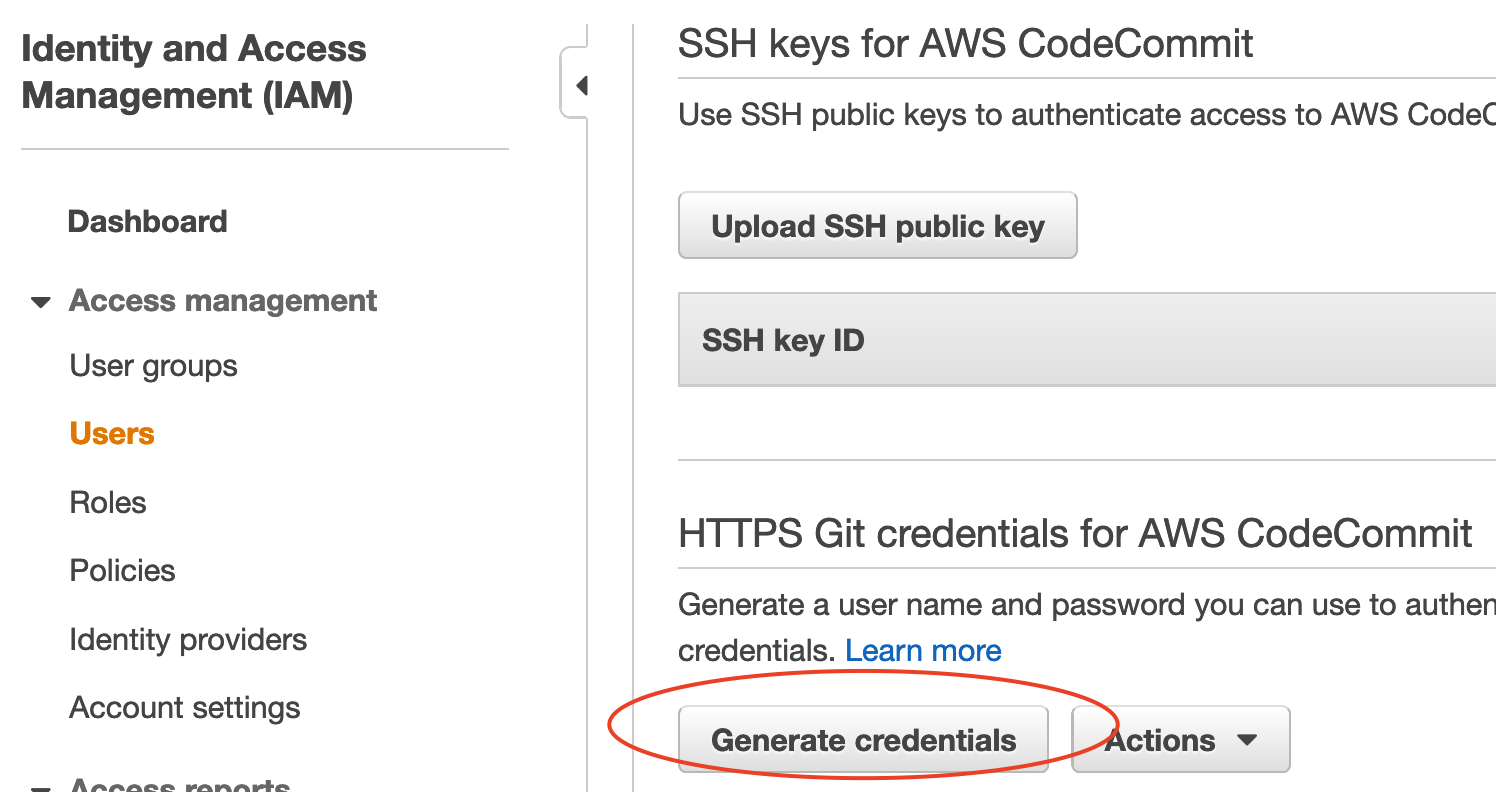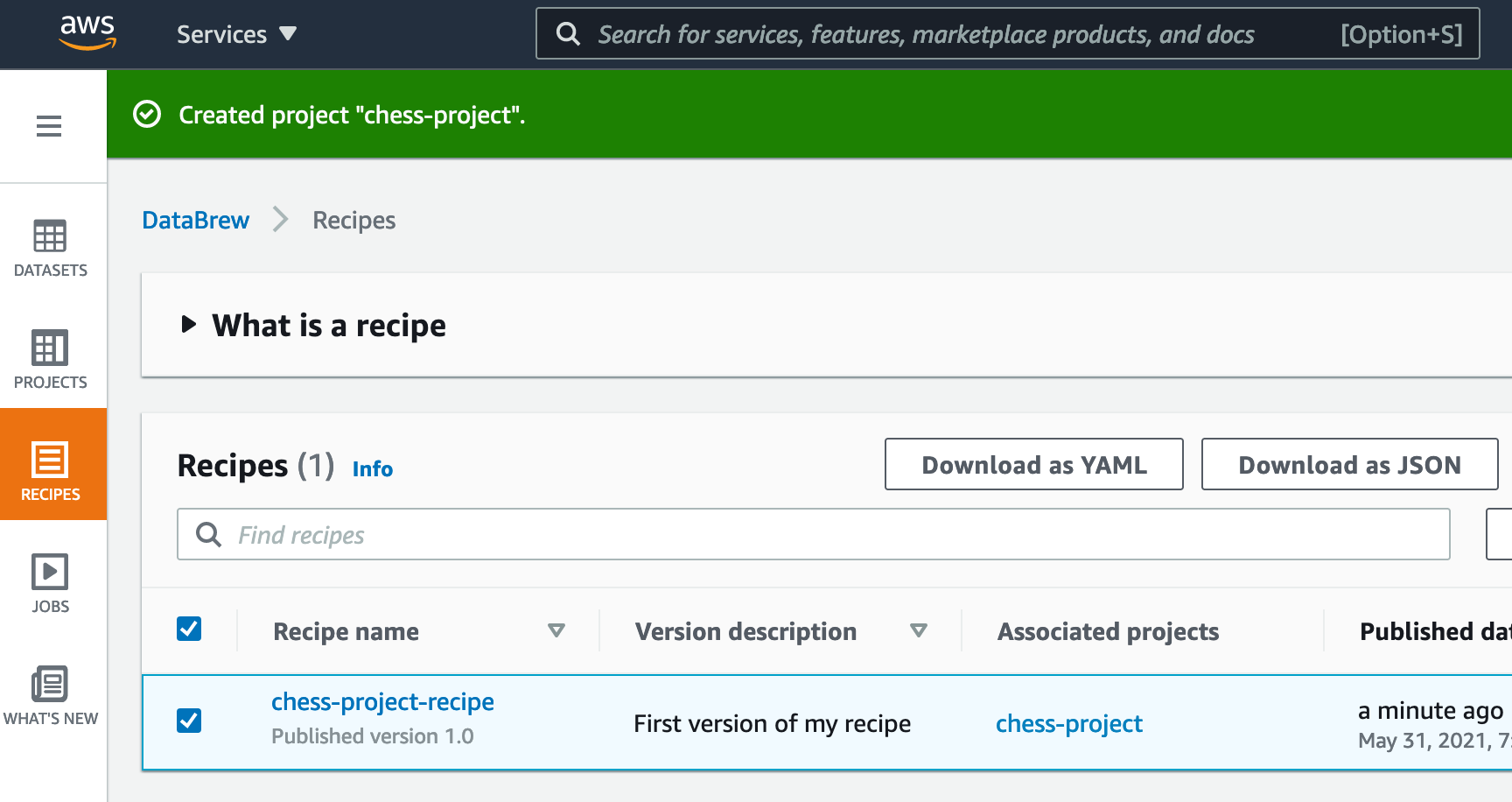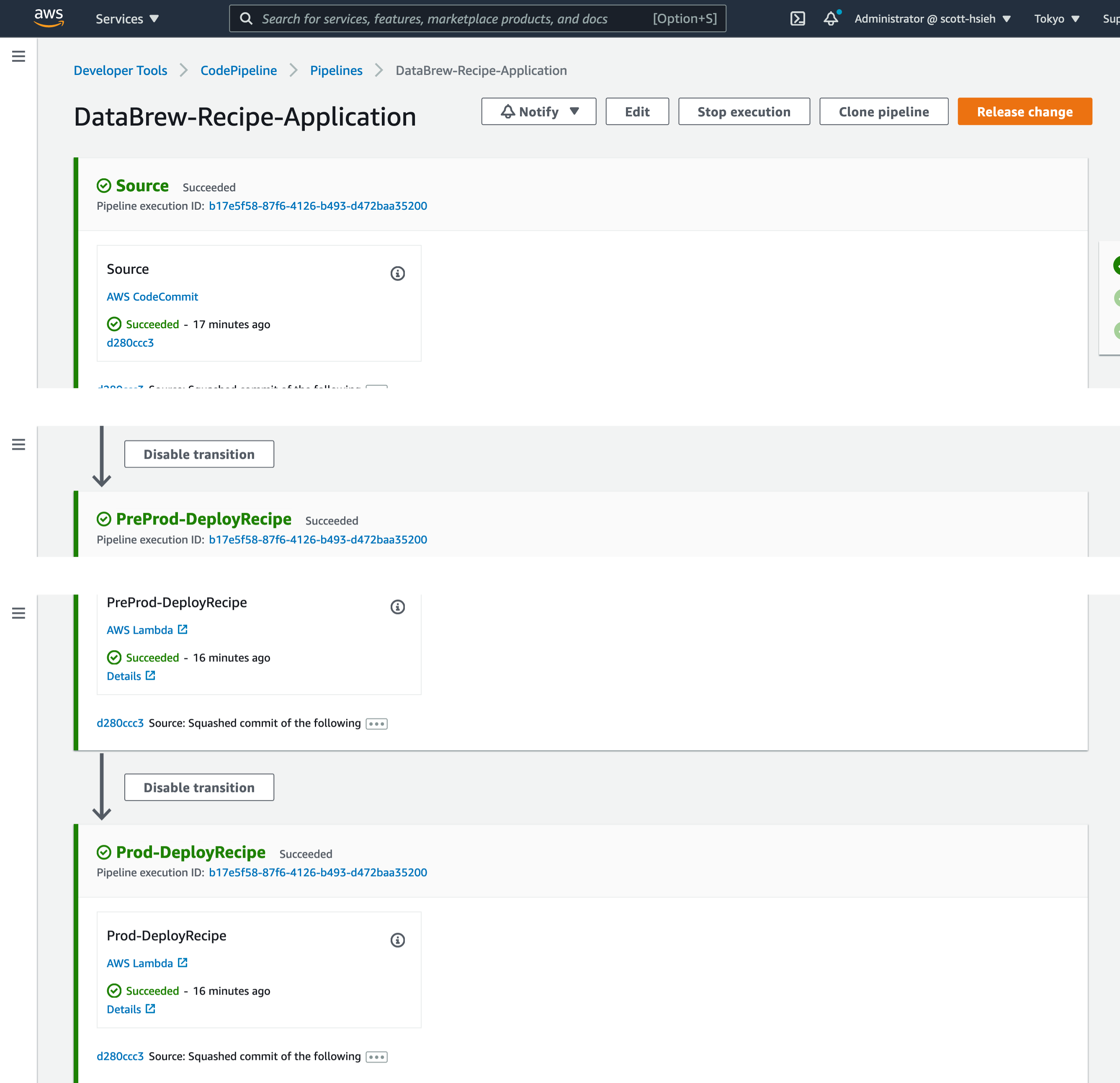 Documentation
¶
Documentation
¶
Overview ¶
A construct for AWS Glue DataBrew wtih CICD
Index ¶
- func CodePipelineIamRole_IsConstruct(x interface{}) *bool
- func DataBrewCodePipeline_IsConstruct(x interface{}) *bool
- func FirstCommitHandler_IsConstruct(x interface{}) *bool
- func IamRole_IsConstruct(x interface{}) *bool
- func InfraIamRole_IsConstruct(x interface{}) *bool
- func NewCodePipelineIamRole_Override(c CodePipelineIamRole, scope constructs.Construct, name *string, ...)
- func NewDataBrewCodePipeline_Override(d DataBrewCodePipeline, scope constructs.Construct, name *string, ...)
- func NewFirstCommitHandler_Override(f FirstCommitHandler, scope constructs.Construct, name *string, ...)
- func NewIamRole_Override(i IamRole, scope constructs.Construct, name *string, props *IamRoleProps)
- func NewInfraIamRole_Override(i InfraIamRole, scope constructs.Construct, name *string, ...)
- func NewPreProductionLambda_Override(p PreProductionLambda, scope constructs.Construct, name *string, ...)
- func NewProductionLambda_Override(p ProductionLambda, scope constructs.Construct, name *string, ...)
- func PreProductionLambda_IsConstruct(x interface{}) *bool
- func ProductionLambda_IsConstruct(x interface{}) *bool
- type CodePipelineIamRole
- type CodePipelineIamRoleProps
- type DataBrewCodePipeline
- type DataBrewCodePipelineProps
- type FirstCommitHandler
- type FirstCommitHandlerProps
- type IamRole
- type IamRoleProps
- type InfraIamRole
- type InfraIamRoleProps
- type PreProductionLambda
- type PreProductionLambdaProps
- type ProductionLambda
- type ProductionLambdaProps
Constants ¶
This section is empty.
Variables ¶
This section is empty.
Functions ¶
func CodePipelineIamRole_IsConstruct ¶
func CodePipelineIamRole_IsConstruct(x interface{}) *bool
Checks if `x` is a construct.
Use this method instead of `instanceof` to properly detect `Construct` instances, even when the construct library is symlinked.
Explanation: in JavaScript, multiple copies of the `constructs` library on disk are seen as independent, completely different libraries. As a consequence, the class `Construct` in each copy of the `constructs` library is seen as a different class, and an instance of one class will not test as `instanceof` the other class. `npm install` will not create installations like this, but users may manually symlink construct libraries together or use a monorepo tool: in those cases, multiple copies of the `constructs` library can be accidentally installed, and `instanceof` will behave unpredictably. It is safest to avoid using `instanceof`, and using this type-testing method instead.
Returns: true if `x` is an object created from a class which extends `Construct`.
func DataBrewCodePipeline_IsConstruct ¶
func DataBrewCodePipeline_IsConstruct(x interface{}) *bool
Checks if `x` is a construct.
Use this method instead of `instanceof` to properly detect `Construct` instances, even when the construct library is symlinked.
Explanation: in JavaScript, multiple copies of the `constructs` library on disk are seen as independent, completely different libraries. As a consequence, the class `Construct` in each copy of the `constructs` library is seen as a different class, and an instance of one class will not test as `instanceof` the other class. `npm install` will not create installations like this, but users may manually symlink construct libraries together or use a monorepo tool: in those cases, multiple copies of the `constructs` library can be accidentally installed, and `instanceof` will behave unpredictably. It is safest to avoid using `instanceof`, and using this type-testing method instead.
Returns: true if `x` is an object created from a class which extends `Construct`.
func FirstCommitHandler_IsConstruct ¶
func FirstCommitHandler_IsConstruct(x interface{}) *bool
Checks if `x` is a construct.
Use this method instead of `instanceof` to properly detect `Construct` instances, even when the construct library is symlinked.
Explanation: in JavaScript, multiple copies of the `constructs` library on disk are seen as independent, completely different libraries. As a consequence, the class `Construct` in each copy of the `constructs` library is seen as a different class, and an instance of one class will not test as `instanceof` the other class. `npm install` will not create installations like this, but users may manually symlink construct libraries together or use a monorepo tool: in those cases, multiple copies of the `constructs` library can be accidentally installed, and `instanceof` will behave unpredictably. It is safest to avoid using `instanceof`, and using this type-testing method instead.
Returns: true if `x` is an object created from a class which extends `Construct`.
func IamRole_IsConstruct ¶
func IamRole_IsConstruct(x interface{}) *bool
Checks if `x` is a construct.
Use this method instead of `instanceof` to properly detect `Construct` instances, even when the construct library is symlinked.
Explanation: in JavaScript, multiple copies of the `constructs` library on disk are seen as independent, completely different libraries. As a consequence, the class `Construct` in each copy of the `constructs` library is seen as a different class, and an instance of one class will not test as `instanceof` the other class. `npm install` will not create installations like this, but users may manually symlink construct libraries together or use a monorepo tool: in those cases, multiple copies of the `constructs` library can be accidentally installed, and `instanceof` will behave unpredictably. It is safest to avoid using `instanceof`, and using this type-testing method instead.
Returns: true if `x` is an object created from a class which extends `Construct`.
func InfraIamRole_IsConstruct ¶
func InfraIamRole_IsConstruct(x interface{}) *bool
Checks if `x` is a construct.
Use this method instead of `instanceof` to properly detect `Construct` instances, even when the construct library is symlinked.
Explanation: in JavaScript, multiple copies of the `constructs` library on disk are seen as independent, completely different libraries. As a consequence, the class `Construct` in each copy of the `constructs` library is seen as a different class, and an instance of one class will not test as `instanceof` the other class. `npm install` will not create installations like this, but users may manually symlink construct libraries together or use a monorepo tool: in those cases, multiple copies of the `constructs` library can be accidentally installed, and `instanceof` will behave unpredictably. It is safest to avoid using `instanceof`, and using this type-testing method instead.
Returns: true if `x` is an object created from a class which extends `Construct`.
func NewCodePipelineIamRole_Override ¶
func NewCodePipelineIamRole_Override(c CodePipelineIamRole, scope constructs.Construct, name *string, props *CodePipelineIamRoleProps)
func NewDataBrewCodePipeline_Override ¶
func NewDataBrewCodePipeline_Override(d DataBrewCodePipeline, scope constructs.Construct, name *string, props *DataBrewCodePipelineProps)
func NewFirstCommitHandler_Override ¶
func NewFirstCommitHandler_Override(f FirstCommitHandler, scope constructs.Construct, name *string, props *FirstCommitHandlerProps)
func NewIamRole_Override ¶
func NewIamRole_Override(i IamRole, scope constructs.Construct, name *string, props *IamRoleProps)
func NewInfraIamRole_Override ¶
func NewInfraIamRole_Override(i InfraIamRole, scope constructs.Construct, name *string, props *InfraIamRoleProps)
func NewPreProductionLambda_Override ¶
func NewPreProductionLambda_Override(p PreProductionLambda, scope constructs.Construct, name *string, props *PreProductionLambdaProps)
func NewProductionLambda_Override ¶
func NewProductionLambda_Override(p ProductionLambda, scope constructs.Construct, name *string, props *ProductionLambdaProps)
func PreProductionLambda_IsConstruct ¶
func PreProductionLambda_IsConstruct(x interface{}) *bool
Checks if `x` is a construct.
Use this method instead of `instanceof` to properly detect `Construct` instances, even when the construct library is symlinked.
Explanation: in JavaScript, multiple copies of the `constructs` library on disk are seen as independent, completely different libraries. As a consequence, the class `Construct` in each copy of the `constructs` library is seen as a different class, and an instance of one class will not test as `instanceof` the other class. `npm install` will not create installations like this, but users may manually symlink construct libraries together or use a monorepo tool: in those cases, multiple copies of the `constructs` library can be accidentally installed, and `instanceof` will behave unpredictably. It is safest to avoid using `instanceof`, and using this type-testing method instead.
Returns: true if `x` is an object created from a class which extends `Construct`.
func ProductionLambda_IsConstruct ¶
func ProductionLambda_IsConstruct(x interface{}) *bool
Checks if `x` is a construct.
Use this method instead of `instanceof` to properly detect `Construct` instances, even when the construct library is symlinked.
Explanation: in JavaScript, multiple copies of the `constructs` library on disk are seen as independent, completely different libraries. As a consequence, the class `Construct` in each copy of the `constructs` library is seen as a different class, and an instance of one class will not test as `instanceof` the other class. `npm install` will not create installations like this, but users may manually symlink construct libraries together or use a monorepo tool: in those cases, multiple copies of the `constructs` library can be accidentally installed, and `instanceof` will behave unpredictably. It is safest to avoid using `instanceof`, and using this type-testing method instead.
Returns: true if `x` is an object created from a class which extends `Construct`.
Types ¶
type CodePipelineIamRole ¶
type CodePipelineIamRole interface {
constructs.Construct
// The tree node.
Node() constructs.Node
// The representative of the IAM role for the CodePipeline CICD pipeline.
Role() awsiam.Role
// The ARN of the IAM role for the CodePipeline CICD pipeline.
RoleArn() *string
// Returns a string representation of this construct.
ToString() *string
}
func NewCodePipelineIamRole ¶
func NewCodePipelineIamRole(scope constructs.Construct, name *string, props *CodePipelineIamRoleProps) CodePipelineIamRole
type CodePipelineIamRoleProps ¶
type CodePipelineIamRoleProps struct {
// The ARN of the S3 bucket where you store your artifacts.
BucketArn *string `field:"required" json:"bucketArn" yaml:"bucketArn"`
// The ARN of the Lambda function for the pre-production account.
PreproductionLambdaArn *string `field:"required" json:"preproductionLambdaArn" yaml:"preproductionLambdaArn"`
// The ARN of the Lambda function for the production account.
ProductionLambdaArn *string `field:"required" json:"productionLambdaArn" yaml:"productionLambdaArn"`
// The role name for the CodePipeline CICD pipeline.
// Default: 'DataBrew-Recipe-Pipeline-Role'.
//
RoleName *string `field:"optional" json:"roleName" yaml:"roleName"`
}
type DataBrewCodePipeline ¶
type DataBrewCodePipeline interface {
constructs.Construct
// The name of the branch that will trigger the DataBrew CICD pipeline.
BranchName() *string
// The ARN of the S3 bucket for the CodePipeline DataBrew CICD pipeline.
BucketArn() *string
// The ARN of the CodeCommit repository.
CodeCommitRepoArn() *string
// The ARN of the DataBrew CICD pipeline.
CodePipelineArn() *string
// the (required) name of the Artifact at the first stage.
FirstStageArtifactName() *string
// The tree node.
Node() constructs.Node
// The ARN of the Lambda function for the pre-production account.
PreproductionFunctionArn() *string
// The ARN of the Lambda function for the production account.
ProductionFunctionArn() *string
// The name of the CodeCommit repositroy for the DataBrew CICD pipeline.
RepoName() *string
// Returns a string representation of this construct.
ToString() *string
}
func NewDataBrewCodePipeline ¶
func NewDataBrewCodePipeline(scope constructs.Construct, name *string, props *DataBrewCodePipelineProps) DataBrewCodePipeline
type DataBrewCodePipelineProps ¶
type DataBrewCodePipelineProps struct {
// The ARN of the IAM role in the pre-production account.
PreproductionIamRoleArn *string `field:"required" json:"preproductionIamRoleArn" yaml:"preproductionIamRoleArn"`
// The ARN of the IAM role in the production account.
ProductionIamRoleArn *string `field:"required" json:"productionIamRoleArn" yaml:"productionIamRoleArn"`
// The name of the branch that will trigger the DataBrew CICD pipeline.
// Default: 'main'.
//
BranchName *string `field:"optional" json:"branchName" yaml:"branchName"`
// The name of the S3 bucket for the CodePipeline DataBrew CICD pipeline.
// Default: 'databrew-cicd-codepipelineartifactstorebucket'.
//
BucketName *string `field:"optional" json:"bucketName" yaml:"bucketName"`
// the (required) name of the Artifact at the first stage.
// Default: 'SourceOutput'.
//
FirstStageArtifactName *string `field:"optional" json:"firstStageArtifactName" yaml:"firstStageArtifactName"`
// The name of the CodePipeline Databrew CICD pipeline.
// Default: 'DataBrew-Recipe-Application'.
//
PipelineName *string `field:"optional" json:"pipelineName" yaml:"pipelineName"`
// The name of the CodeCommit repositroy for the DataBrew CICD pipeline.
// Default: 'DataBrew-Recipes-Repo'.
//
RepoName *string `field:"optional" json:"repoName" yaml:"repoName"`
}
type FirstCommitHandler ¶
type FirstCommitHandler interface {
constructs.Construct
// The representative of Lambda function which deals with first commit via AWS CodeCommit.
Function() awslambda.IFunction
// The name of the Lambda function which deals with first commit via AWS CodeCommit.
FunctionName() *string
// The tree node.
Node() constructs.Node
// The name of the IAM role for the Lambda function which deals with first commit via AWS CodeCommit.
RoleName() *string
// Returns a string representation of this construct.
ToString() *string
}
func NewFirstCommitHandler ¶
func NewFirstCommitHandler(scope constructs.Construct, name *string, props *FirstCommitHandlerProps) FirstCommitHandler
type FirstCommitHandlerProps ¶
type FirstCommitHandlerProps struct {
// The branch name used in the CodeCommit repo.
BranchName *string `field:"required" json:"branchName" yaml:"branchName"`
// The ARN of the CodeCommit repository.
CodeCommitRepoArn *string `field:"required" json:"codeCommitRepoArn" yaml:"codeCommitRepoArn"`
// The name of the CodeCommit repo.
RepoName *string `field:"required" json:"repoName" yaml:"repoName"`
// The name of the Lambda function which deals with first commit via AWS CodeCommit.
// Default: 'FirstCommitHandler'.
//
FunctionName *string `field:"optional" json:"functionName" yaml:"functionName"`
// The name of the IAM role for the Lambda function which deals with first commit via AWS CodeCommit.
// Default: 'LambdaForInitialCommitRole'.
//
RoleName *string `field:"optional" json:"roleName" yaml:"roleName"`
}
type IamRole ¶
type IamRole interface {
constructs.Construct
// The tree node.
Node() constructs.Node
// The ARN of the IAM role for pre-production or production.
RoleArn() *string
// Returns a string representation of this construct.
ToString() *string
}
IAM Role.
Defines an IAM role for pre-production and production AWS accounts.
func NewIamRole ¶
func NewIamRole(scope constructs.Construct, name *string, props *IamRoleProps) IamRole
type IamRoleProps ¶
type IamRoleProps struct {
// The ID of your infrastructure account.
AccountID *string `field:"required" json:"accountID" yaml:"accountID"`
// 'preproduction' or 'production'.
Environment *string `field:"required" json:"environment" yaml:"environment"`
// The role name.
// Default: '{environment}-Databrew-Cicd-Role'.
//
RoleName *string `field:"optional" json:"roleName" yaml:"roleName"`
}
type InfraIamRole ¶
type InfraIamRole interface {
constructs.Construct
// The tree node.
Node() constructs.Node
// The ARN of the IAM role for the infrastructure account.
RoleArn() *string
// Returns a string representation of this construct.
ToString() *string
}
func NewInfraIamRole ¶
func NewInfraIamRole(scope constructs.Construct, name *string, props *InfraIamRoleProps) InfraIamRole
type InfraIamRoleProps ¶
type InfraIamRoleProps struct {
// The role name for the infrastructure account.
// Default: 'CrossAccountRepositoryContributorRole'.
//
RoleName *string `field:"optional" json:"roleName" yaml:"roleName"`
}
type PreProductionLambda ¶
type PreProductionLambda interface {
constructs.Construct
// The representative of Lambda function for the pre-production account.
Function() awslambda.IFunction
// The Lambda funciton name for the pre-production account.
FunctionName() *string
// The tree node.
Node() constructs.Node
// The name of the IAM role for the pre-produciton Lambda function.
RoleName() *string
// Returns a string representation of this construct.
ToString() *string
}
func NewPreProductionLambda ¶
func NewPreProductionLambda(scope constructs.Construct, name *string, props *PreProductionLambdaProps) PreProductionLambda
type PreProductionLambdaProps ¶
type PreProductionLambdaProps struct {
// The ARN of the S3 bucket for the DataBrew CICD pipeline.
BucketArn *string `field:"required" json:"bucketArn" yaml:"bucketArn"`
// The ARN of the IAM role in the pre-production account.
PreproductionIamRoleArn *string `field:"required" json:"preproductionIamRoleArn" yaml:"preproductionIamRoleArn"`
// The Lambda funciton name for the pre-production account.
// Default: 'PreProd-DataBrew-Recipe-Deployer'.
//
FunctionName *string `field:"optional" json:"functionName" yaml:"functionName"`
// The name of the IAM role for the pre-produciton Lambda function.
// Default: 'PreProd-DataBrew-Recipe-Deployer-role'.
//
RoleName *string `field:"optional" json:"roleName" yaml:"roleName"`
}
type ProductionLambda ¶
type ProductionLambda interface {
constructs.Construct
// The representative of Lambda function for the production account.
Function() awslambda.IFunction
// The Lambda funciton name for the production account.
FunctionName() *string
// The tree node.
Node() constructs.Node
// The name of the IAM role for the produciton Lambda function.
RoleName() *string
// Returns a string representation of this construct.
ToString() *string
}
func NewProductionLambda ¶
func NewProductionLambda(scope constructs.Construct, name *string, props *ProductionLambdaProps) ProductionLambda
type ProductionLambdaProps ¶
type ProductionLambdaProps struct {
// The ARN of the S3 bucket for the DataBrew CICD pipeline.
BucketArn *string `field:"required" json:"bucketArn" yaml:"bucketArn"`
// The ARN of the IAM role in the production account.
ProductionIamRoleArn *string `field:"required" json:"productionIamRoleArn" yaml:"productionIamRoleArn"`
// The Lambda funciton name for the production account.
// Default: 'Prod-DataBrew-Recipe-Deployer'.
//
FunctionName *string `field:"optional" json:"functionName" yaml:"functionName"`
// The name of the IAM role for the produciton Lambda function.
// Default: 'Prod-DataBrew-Recipe-Deployer-role'.
//
RoleName *string `field:"optional" json:"roleName" yaml:"roleName"`
}
 Source Files
¶
Source Files
¶
- CodePipelineIamRole.go
- CodePipelineIamRoleProps.go
- CodePipelineIamRole__checks.go
- DataBrewCodePipeline.go
- DataBrewCodePipelineProps.go
- DataBrewCodePipeline__checks.go
- FirstCommitHandler.go
- FirstCommitHandlerProps.go
- FirstCommitHandler__checks.go
- IamRole.go
- IamRoleProps.go
- IamRole__checks.go
- InfraIamRole.go
- InfraIamRoleProps.go
- InfraIamRole__checks.go
- PreProductionLambda.go
- PreProductionLambdaProps.go
- PreProductionLambda__checks.go
- ProductionLambda.go
- ProductionLambdaProps.go
- ProductionLambda__checks.go
- main.go





 Romi B. and Gaurav W., 2021
Romi B. and Gaurav W., 2021



